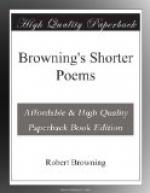’Tis but a case of mania: subinduced
By epilepsy, at the turning-point
80
Of trance prolonged unduly some three days
When, by the exhibition of some drug
Or spell, exorcisation, stroke of art
Unknown to me and which ’twere well to know,
The evil thing, out-breaking all at once,
Left the man whole and sound of body indeed,—
But, flinging (so to speak) life’s gates too
wide,
Making a clear house of it too suddenly,
The first conceit that entered might inscribe
Whatever it was minded on the wall
90
So plainly at that vantage, as it were,
(First come, first served) that nothing subsequent
Attaineth to erase those fancy-scrawls
The just-returned and new-established soul
Hath gotten now so thoroughly by heart
That henceforth she will read or these or none.
And first—the man’s own firm conviction
rests
That he was dead (in fact they buried him)
—That he was dead and then restored to
life
By a Nazarene physician of his tribe:
100
—’Sayeth, the same bade “Rise,”
and he did rise,
“Such cases are diurnal,” thou wilt cry.
Not so this figment!—not, that such a fume,
Instead of giving way to time and health,
Should eat itself into the life of life.
As saffron tingeth flesh, blood, bones, and all!
For see, how he takes up the after-life,
The man—it is one Lazarus, a Jew,
Sanguine, proportioned, fifty years of age,
The body’s habit wholly laudable,
110
As much, indeed, beyond the common health.
As he were made and put aside to show.
Think, could we penetrate by any drug
And bathe the wearied soul and worried flesh,
And bring it clear and fair, by three days’
sleep!
Whence has the man the balm that brightens all?
This grown man eyes the world now like a child.
Some elders of his tribe, I should premise,
Led in their friend, obedient as a sheep,
To bear my inquisition. While they spoke,
120
Now sharply, now with sorrow,—told the
case,—
He listened not except I spoke to him,
But folded his two hands and let them talk,
Watching the flies that buzzed: and yet no fool.
And that’s a sample how his years must go.
Look if a beggar, in fixed middle-life,
Should find a treasure,—can he use the
same
With straitened habits and with tastes starved small,
And take at once to his impoverished brain
The sudden element that changes things,
130
That sets the undreamed-of rapture at his hand,
And puts the cheap old joy in the scorned dust?
Is he not such an one as moves to mirth—
Warily parsimonious, when no need,
Wasteful as drunkenness at undue times?
All prudent counsel as to what befits




